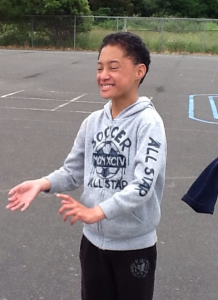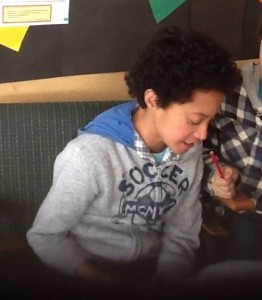Boston is an 11 year old student who is blind. He is in year 6 in a mainstream class at his local school.
This year Boston has been working on developing his social skills around friendships. This helps Boston to articulate how he is feeling (figure 1).
Here Boston’s BLENNZ Resource Teacher: Vision (RTV) Judy Fox talks about how this process has helped him to understanding his own feelings and those of his peers.
Figure 1 Boston is beginning his charade of ‘what makes him feel happy.’
What is happening now?
Once a week, Boston is participating in a small group with his peers following the programme in the book called the ‘Friendship Formula’ by Alison Schroeder. During these sessions Boston has been learning to articulate ‘how he feels inside’ (figure 2). Boston and the group also looked at different personality traits and decided which ones they felt related to them.
Figure 2 Boston is being interviewed about ‘how he feels inside’
Prerequisite skills
Previous to thinking about how he felt inside, Boston had to think about his physical appearance, activities he enjoyed and didn’t enjoy, activities he was good at or activities he found difficult. He also thought about his favourite things.
This video shows Boston’s charade about something that makes him happy.
Possible next steps
- Choose five positive things about his inner self and/or outer self.
- Choose between one and three things he does not like about himself.
- Think of one thing he would like to change about himself.
- Think of ways he could possibly achieve this (making sure the changes are achievable).
- Draw around his hand and on each finger write one thing he has achieved.
Teaching methods and strategies
- Games were played at the beginning of each session – the game related to the upcoming session e.g. when we were talking about favourite things we played the blindfolded ‘taste game’.
- Create an environment where the students felt it was safe to share their thoughts and feelings.
- Reinforce that Boston and the group had to respect each other and respond in kind and thoughtful ways.
- Where possible ideas presented by the students were used e.g. instead of writing down their personality traits, the students wanted to create an interview situation that was recorded.
Learning adaptations
- Use a reader/writer for Boston in those activities that required it.
- Some of the activities/games were adapted to make it easier for Boston to participate fully e.g. in the balloon game a bell was added to the balloon so Boston could hear where it was.
- We worked in the staffroom each week and furniture was moved to create space.
- When we played Charades, Boston and Judy would briefly leave the room and Judy would say what charade he had picked and the RTV would discuss how he was going to act it.
Assessment
The initial evidence was anecdotal based on previous observations. Observation has been an integral part of the planning for the following week’s work, to attempt to ensure that there is understanding of what has been covered so far. Some areas are difficult for Boston to understand and will need to be revisited.
Useful Links
- Teaching Students with Sensory Impairments: Social Skills – Trinity University website.
- Social Skills for Children and Youth with visual impairments (Perkins: Chapter 1-8) – YouTube.
- Developing Social Skills in children who are blind or visually impaired with Sharon Sacks – YouTube.
- The Friendship Formula Game – Socially Speaking website.
More information
Email us at BLENNZ for more information about this subject. We will link you up with either the author of this post or another BLENNZ colleague with whom you can continue your conversation.


